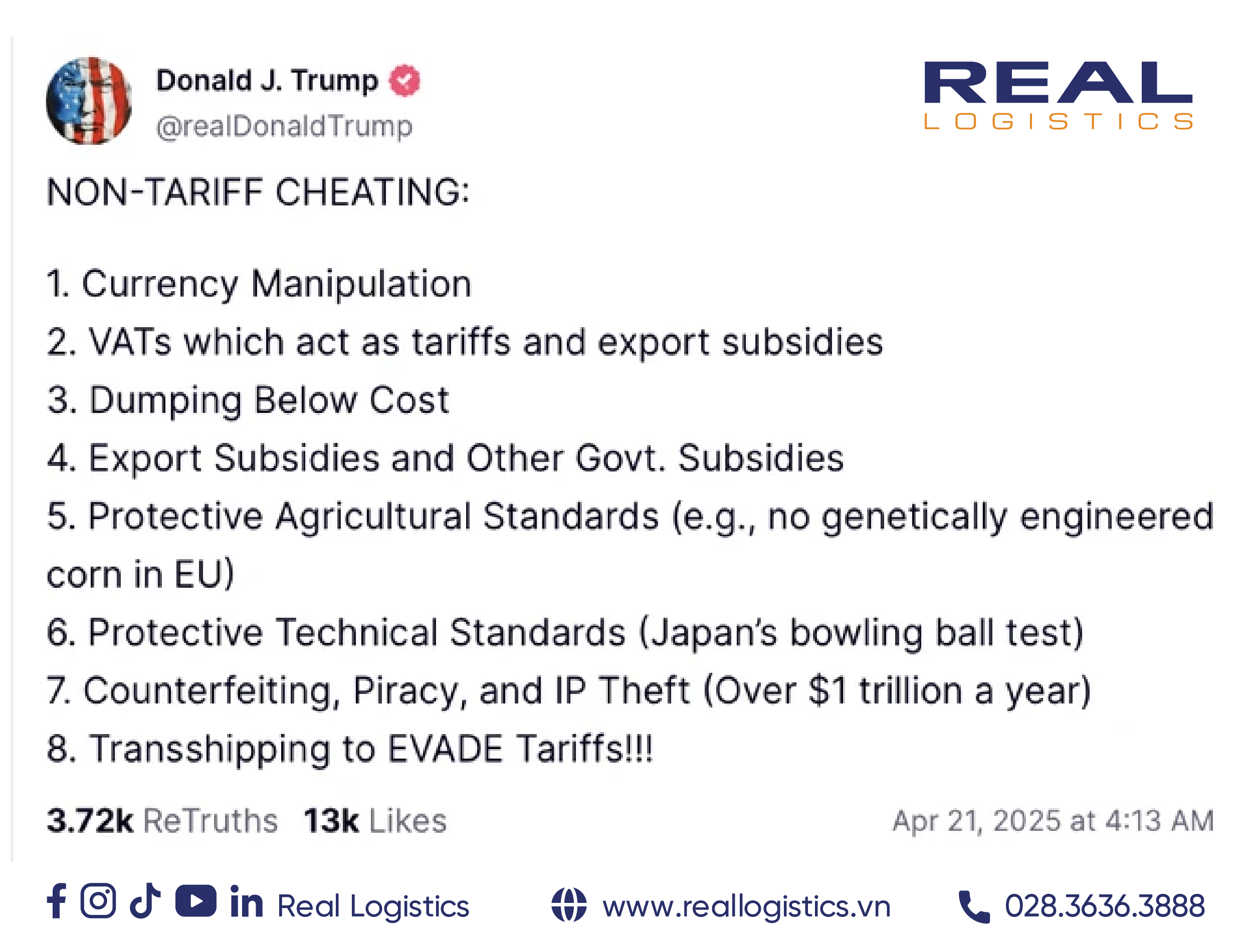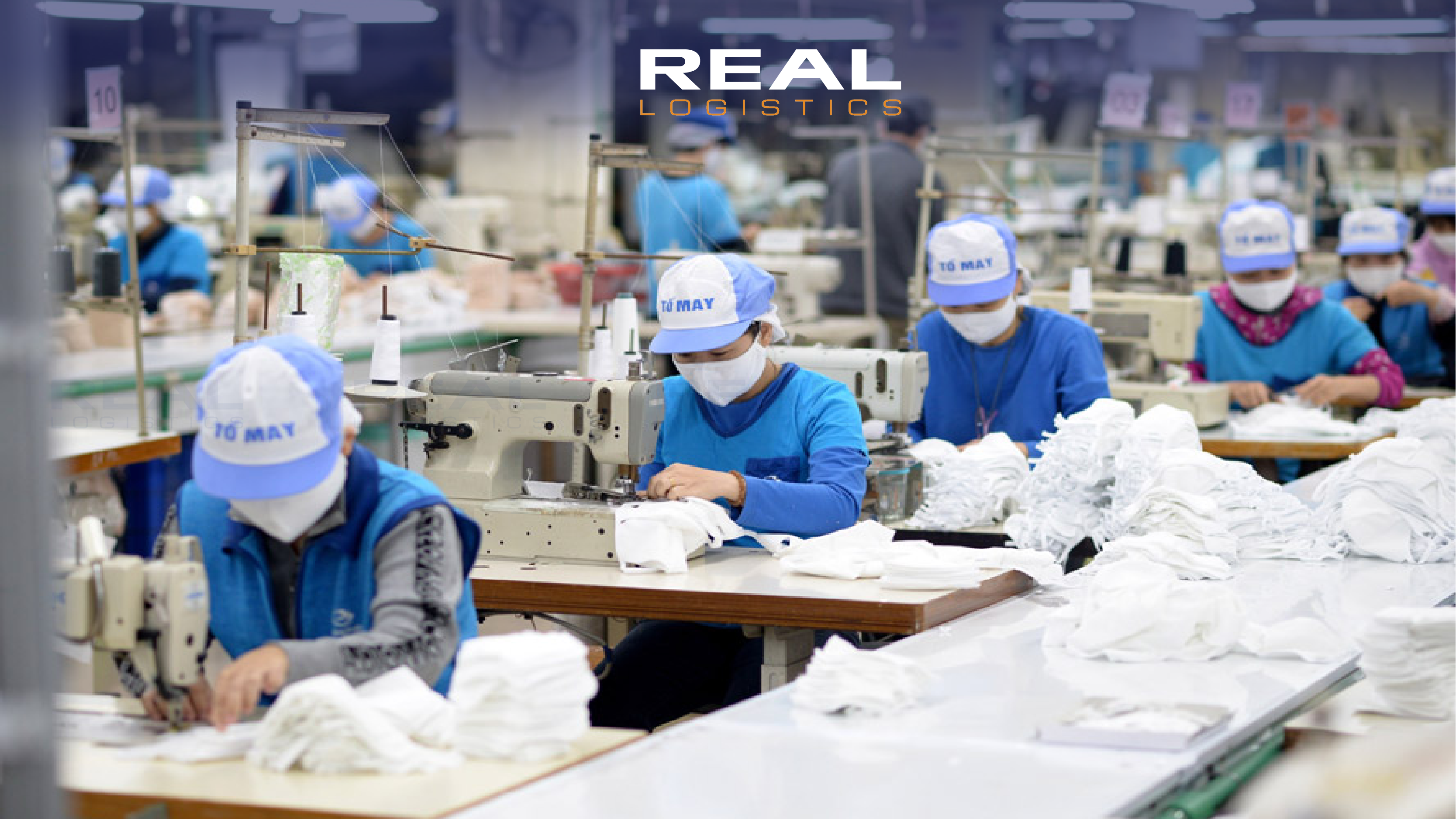Trump Points 8 Non-Tariff Trade Fraud Practices – What Are the Implications for Vietnam?

On April 21, 2025, former U.S. President Donald Trump published a list of eight forms of non-tariff trade fraud he claims are being used to distort global trade and harm the American economy. The announcement comes days before high-stakes negotiations with Japan and South Korea and is widely seen as a pressure tactic. However, the implications could extend far beyond those countries—Vietnam may also face scrutiny.
1. The 8 Non-Tariff Trade Practices Highlighted by Trump
- Currency Manipulation – Artificially devaluing currency to boost exports.
- VAT Rebates as Hidden Tariffs – Using VAT refund policies to subsidize exports.
- Dumping Below Cost – Selling goods at prices lower than production costs.
- Export Subsidies and Government Support – Direct or indirect government funding for exporters.
- Protectionist Agricultural Standards – Bans like the EU’s restriction on GMO corn.
- Technical Trade Barriers – Overly strict standards, e.g., Japan’s vehicle “bowling ball test”.
- Intellectual Property Theft and Counterfeiting – Estimated to cost the U.S. over $1 trillion annually.
- Transshipment to Evade Tariffs – Routing goods through third countries to avoid duties.

2. Key Risks for Vietnam
2.1. Currency Manipulation:
Vietnam was previously listed under the U.S. currency manipulation watchlist in 2020. Although removed in 2021, the recent depreciation of the Vietnamese đồng and a trade surplus with the U.S. exceeding $110 billion could attract renewed scrutiny.
2.2. VAT Rebates:
Vietnam applies a 10% VAT rate, offering 0% VAT for export goods. This system may be viewed by U.S. authorities as an indirect export subsidy, particularly in competitive sectors like textiles, electronics, and agriculture.
2.3. Transshipment Concerns:
Vietnam has faced allegations of being a transit point for Chinese goods, such as the 2019 steel case that resulted in over 400% U.S. duties. Stricter U.S. enforcement in 2025 may revisit these concerns.
2.4. Intellectual Property Compliance:
Vietnam is making strides, but challenges in e-commerce enforcement and counterfeiting remain. Strengthening IP protection could help avoid future disputes.
2.5. Technical and Agricultural Standards:
Although Vietnam generally avoids excessive protectionism, some import licensing and quality controls could be seen by the U.S. as disguised trade barriers.
3. Strategic Actions for Vietnamese Exporters
If “named” as non-tariff fraud, Vietnam’s key products (textiles, electronics, agriculture and fisheries) will face:
- High punitive tariffs
- New technical barriers
- Losing competitive advantage in the US market
- Increasing logistics costs and proving origin

To mitigate potential fallout and maintain access to the U.S. market, Vietnam’s exporters and policymakers should consider the following:
- Implement digital tracking for Certificates of Origin (CO) and control high-risk imports, especially from China.
- Ensure export VAT rebates are fully transparent and comply with WTO norms to avoid being labeled as export subsidies.
- Coordinate with U.S. trade associations to address counterfeiting and copyright concerns.
- Audit current import regulations and testing procedures to prevent accusations of disguised protectionism.
- Reduce overdependence on the U.S. by expanding trade with the EU, Japan, and ASEAN. Increase domestic value-added in export goods to improve trade resilience.
- Proactively join trade negotiations or FTA discussions to develop safeguards and clarify compliance with U.S. trade laws.
4. Conclusion
President Trump’s accusations of non-tariff trade fraud mark a new phase of aggressive U.S. trade enforcement. Vietnam’s status as a top U.S. trade partner means it must take these warnings seriously. Exporters, trade associations, and government agencies alike need to act now to secure market access, avoid reputational damage, and ensure compliance.
At Real Logistics, we understand how quickly trade dynamics can shift. Our expert team continuously monitors regulatory updates and supports Vietnamese exporters in navigating global risks. Whether it's supply chain compliance, CO digitization, or rerouting logistics, we help you stay competitive in a volatile world.

